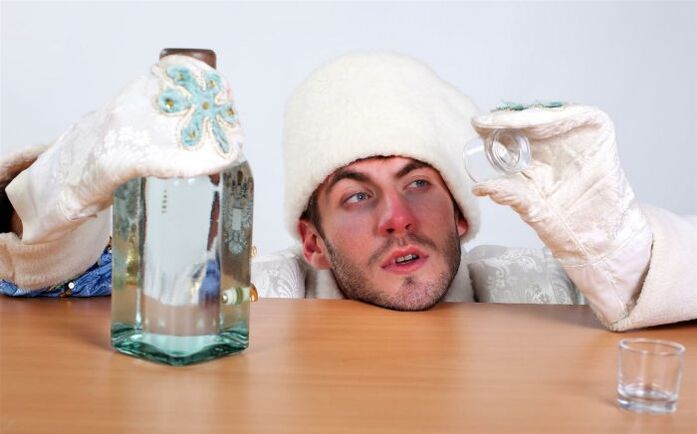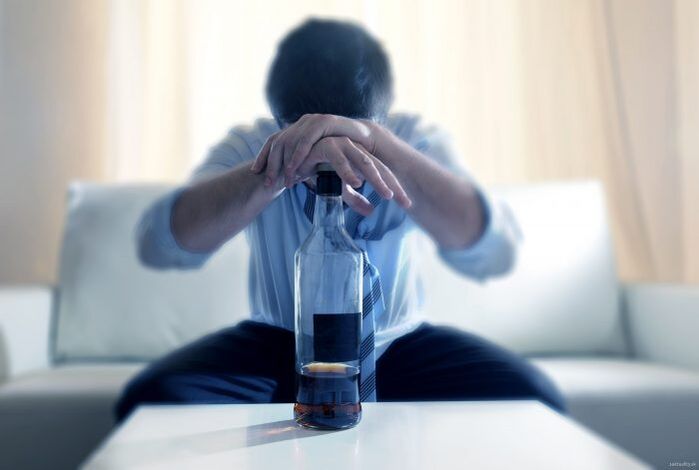Alcoholism is one of the most talked about topics. This threatens family relationships, and society as a whole. Is it not surprising that after a while the patient’s relatives wondered how to make the person stop drinking?
Causes of alcohol addiction
Before you know how to help someone stop drinking, you need to understand why he or she is drinking. By isolating the cause, you have a better chance of healing the person’s persuasion. More often, the onset of alcoholism is a psychological addiction, so it is important to help one understand that this is an addiction, not a habit. In most cases, there are four reasons why people start drinking:
- for companies;
- stress relief;
- boredom;
- out of the ordinary.
A popular reason why someone starts suffering from alcoholism is drinking for the company. As the only observer among peers, it is difficult to maintain an assertive attitude. For some people, especially teenagers, it is an honor to support a company in its endeavors.

When a person is not surrounded by a rainbow environment, and problems persist at work, he or she starts drinking alcohol to relieve this stressful stress. While drinking strong feelings, negative emotions, maybe for a moment the problem does not exist. In fact, it won’t go away anywhere if you don’t decide on it. As a result, possible exits in such a situation should be managed. Once the poisoning passes, the person re -experiences negative emotions, concluding that to avoid it, one cannot stop drinking.
Drinking out of boredom is a loose concept. This is not a short -term situation where one has nothing to do. We are talking about a long period of time where a person is faced with a situation that does not allow him to use force, to focus on something specific. More often in these situations, mechanisms are triggered to help reconcile with oneself.
The most dangerous reason where it is difficult to answer the question of how to help alcoholics stop drinking is the habit of alcoholism. In this case, it is difficult for a person not to drink, because the habit has become his daily habit and it is already difficult to imagine his life without it. In this case, the motivation to stop drinking must be very serious, otherwise it is almost impossible to convince someone to stop drinking alcohol.

It is often very difficult to determine an original cause of addiction. All of these are interconnected and work together. When alcoholism reaches its final stage, then we are talking about the craving for alcohol physically. In this case, the help of alcohol without drugs is impossible. If one himself wants to get rid of this disease, this will be very helpful in further treatment.
Does persuasion work?
How do I Get Alcohol to Cure? In fact, there are many ways to prevent someone from drinking. The most popular way is to persuade and convince the person to stop drinking alcohol. This is a gentler way to help her.
You can quit smoking in a more radical way - this is a nervous shock after drinking. This segment also includes patient intimidation. The third aid sector is the addition of various medicines or folk remedies to food. Before you understand how to help a drinker to stop drinking, it’s a good idea to know the form of alcoholism that will lie, what exactly makes the person addicted.

Since adding some drugs or folk remedies to food is a very radical method that requires caution and prior consultation with a doctor, then it is necessary to start with a milder method, in particular, you need to help those who are alcoholic with conversation.
During this conversation, it is good to make the person stop drinking alcohol. The most effective way to persuade an alcoholic to be treated is in the first stage of alcoholism, when the person has not yet lost the ability to see reality critically.
Before starting a conversation, think about the facts you will be giving to alcohol users. If he saw how horrible it was from the side while drunk, maybe this would push him to make a radical decision. Maybe he already wants to quit, but the will doesn’t allow for lack of a "very important" reason.
How to convince an alcoholic of the dangers of his habit? It is best to gather family or friendly advice. In the circles in this conversation, there is only the closest person that the person trusts. In the first stage, it is easy to wipe someone out of alcohol. Enough to tell him about his drunken behavior, show him a tape from a recent party. If a person has not lost the ability to think adequately, he will feel scared and ashamed of his behavior, so stop drinking.

It’s good to remind yourself of body intoxication, especially when it doesn’t allow you to spend time with family or in the way people like sick people. It is important that any habit must be maintained, which means spending money on it. Make calculations by stating them in movie trips, trips for kids, and other activities.
It is important to prepare in advance for the fact that your attempts to figure out how to make you stop drinking will be felt with hostility, hatred and quarrels. In this case, it is very important to remember the answer to the question. Is it possible to hear cries or, conversely, freely agree to the conditions put forward by the patient? No matter what. Better explain in a calm voice that no one is going to force anyone, but why not pay attention to the alternatives available.
If you manage to stay away from the theory of how to convince someone to be treated for a certain outcome, don’t ever leave him or her in such a situation. Continuing to support, perhaps he himself does not know how to free himself from addiction. Not everyone can stop drinking at home. Find a suitable clinic, make an appointment with a doctor, help the person who gets it. Someone who stops drinking needs help more than ever.
Other choice
One of the unwanted options to use is intimidation, if you think of ways to help, stopping drinking is very difficult, and there is also additional stress. It should be understood that this work technique can lead to the opposite effect.
This method is only suitable for patients who fit a particular psychotype. Some may consider this behavior to be aggressive, which is clearly not the best reaction.
There is not always persuasion, argument, intimidation. Sometimes this is not enough if alcoholism has already entered a deeper level. In this case, you need to use special medications. This can be a regular remedy or something from a folk recipe.
With the help of industrial pharmacological drugs, it is possible to form a feeling of dislike of alcohol in people who drink. Such a method exists even if a person does not know that he is receiving it, although the desire to get rid of addiction directly helps to achieve more.

Drugs are added to alcohol or food. This often leads to a decline in well -being immediately after drinking alcohol. After several such cases, alcoholics begin to associate bad conditions with alcohol and think about stopping drinking.
Medicines used for that purpose contain disulfiram or cyanamide. As a result, the body cannot process ethyl alcohol normally. There is an accumulation of putrefaction products in the blood, which is the cause of persistent poisoning.
During this therapy, once you know the effects of the drug, it is good to have another discussion, asking the alcoholic to undergo treatment. It is important to explain the advantages of inpatient treatment:
- relapse prevention;
- psychological assistance;
- continuous monitoring of health conditions;
- internal damage recovery.
The best way to get rid of addiction is hospital treatment, where the patient will be constantly monitored by a narcologist. The smallest number of relapses was observed with this treatment.
Stages of alcoholism
Alcoholism is usually divided into three stages, for each of which special symptoms and a number of health consequences are assumed. The first level is more difficult in terms of identifying problems with the person’s appearance. Unbeknownst to himself and those around him, a person gradually increases the dose of what he drinks, because a certain amount of experience is gained, which does not allow him to reach the desired level of intoxication with the same dose of alcohol.
Already in such a situation, a person cannot stop and stop drinking, unless he shows him about the related problem. After a person drinks, he begins to experience nausea and vomiting. Often the patient suffers from memory loss, he cannot remember what he did yesterday. Memory loss is partial.

As a result, after the first stage of alcoholism, a person faces a continuous increase in alcohol consumption. At the same time, the liquor can be repeated two or three times a week. The problem in this case is the lack of care for loved ones, and as a consequence, increased addiction.
As a person moves into the second stage of alcoholism, the external signs become more pronounced. The first banquet that appears, when a person drinks alcohol without a break for two or three days, speaks of the formation of second -stage alcoholism. During this time, a form of physical addiction begins to form.
The person begins to feel hungry, as this is the only way to relieve the situation. Such symptoms are a clear sign of the second stage of the disease. In addition, the person experiences constant weakness, headache, dizziness, nausea, sweating. Unpleasant tremors begin to permeate throughout the body, first expressed on the hands. The second stage can last for years, up to two decades, but can be limited to two years. In the final stages of the second stage, a person no longer has the opportunity to solve his or her own problems, only a doctor will help.
The last rank is the third. When it is formed, everyone can see someone as an alcoholic. The appearance began to change. Someone has a face that is always swollen, from which one kilometer smells of alcohol. During this time, many chronic diseases are formed, psychosis in its severe form and other problems have emerged. In such circumstances, people, as a rule, are already left without family or surrounded by people in similar circumstances. In the third stage of alcoholism, a person loses his social position, the ability to think critically. This case will not return to normal life.
























